Volkswagen's Emission Scandal and Ethical Leadership Report
VerifiedAdded on 2020/11/23
|11
|3776
|359
Report
AI Summary
This report examines the ethical dimensions of the Volkswagen emission scandal, focusing on the company's use of "cheat software" to manipulate emission tests. It identifies key stakeholders, including employees, shareholders, and customers, and analyzes the impact of the scandal on each group. The report discusses the importance of ethical thinking in business, providing recommendations for Volkswagen to improve its ethical framework. Furthermore, it delves into two ethical theories, utilitarianism and Kantianism, applying them to the Volkswagen case to assess the ethical implications of the company's actions. The analysis highlights how Volkswagen's practices contradicted utilitarian principles and caused significant negative consequences, including reputational damage and financial losses. The report emphasizes the need for ethical leadership and the creation of ethical organizations to prevent such unethical practices in the future.
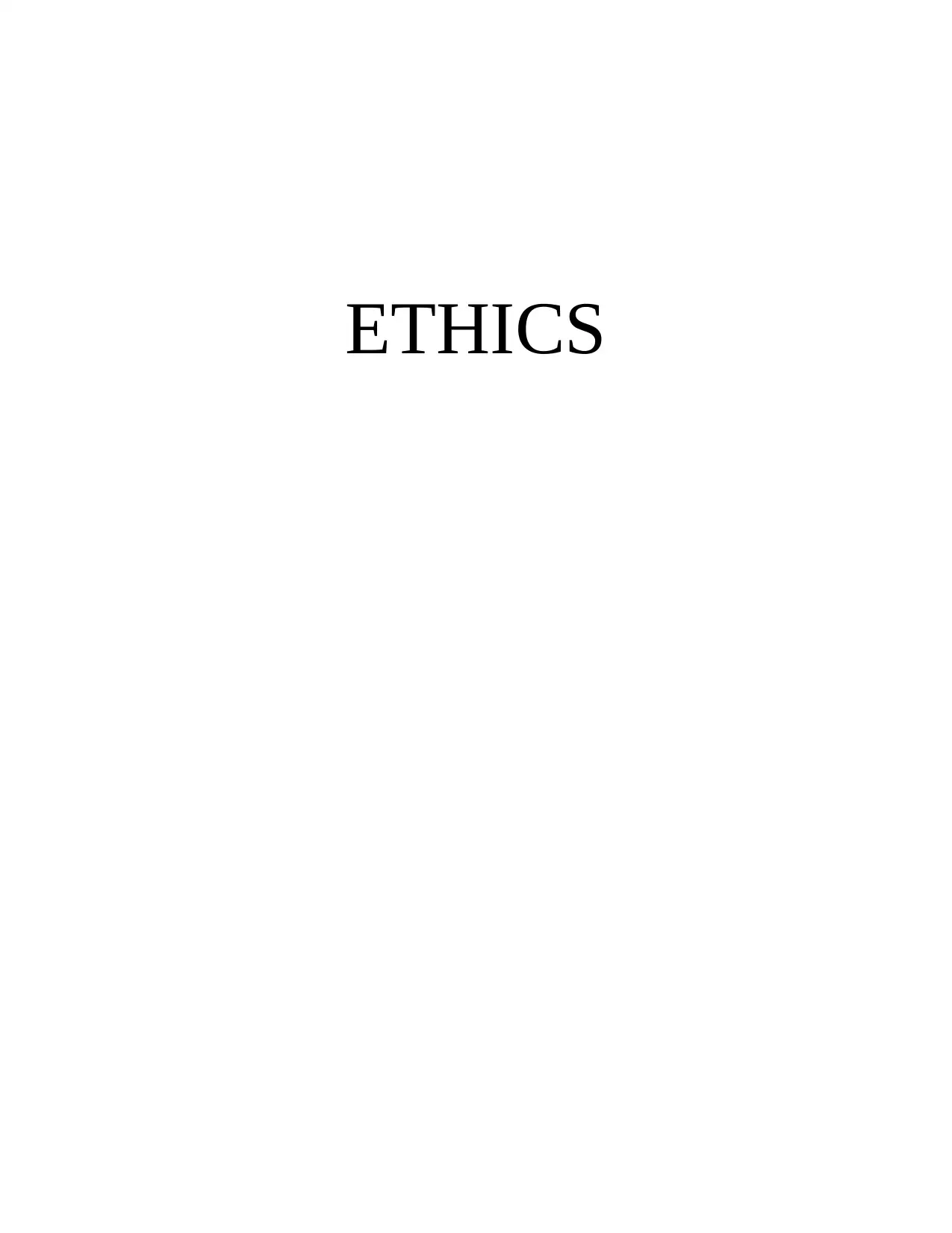
ETHICS
Paraphrase This Document
Need a fresh take? Get an instant paraphrase of this document with our AI Paraphraser
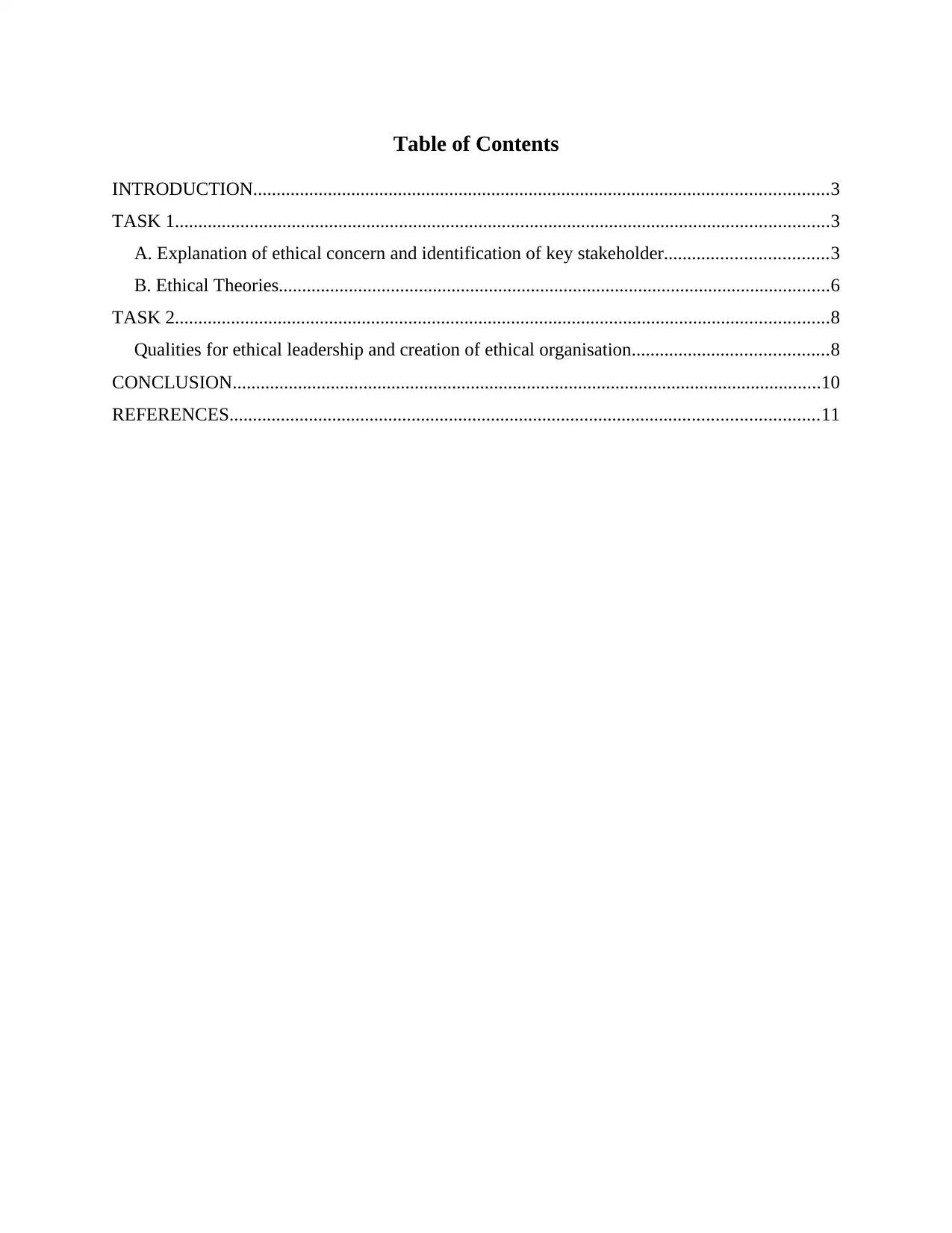
Table of Contents
INTRODUCTION...........................................................................................................................3
TASK 1............................................................................................................................................3
A. Explanation of ethical concern and identification of key stakeholder...................................3
B. Ethical Theories......................................................................................................................6
TASK 2............................................................................................................................................8
Qualities for ethical leadership and creation of ethical organisation..........................................8
CONCLUSION..............................................................................................................................10
REFERENCES..............................................................................................................................11
INTRODUCTION...........................................................................................................................3
TASK 1............................................................................................................................................3
A. Explanation of ethical concern and identification of key stakeholder...................................3
B. Ethical Theories......................................................................................................................6
TASK 2............................................................................................................................................8
Qualities for ethical leadership and creation of ethical organisation..........................................8
CONCLUSION..............................................................................................................................10
REFERENCES..............................................................................................................................11
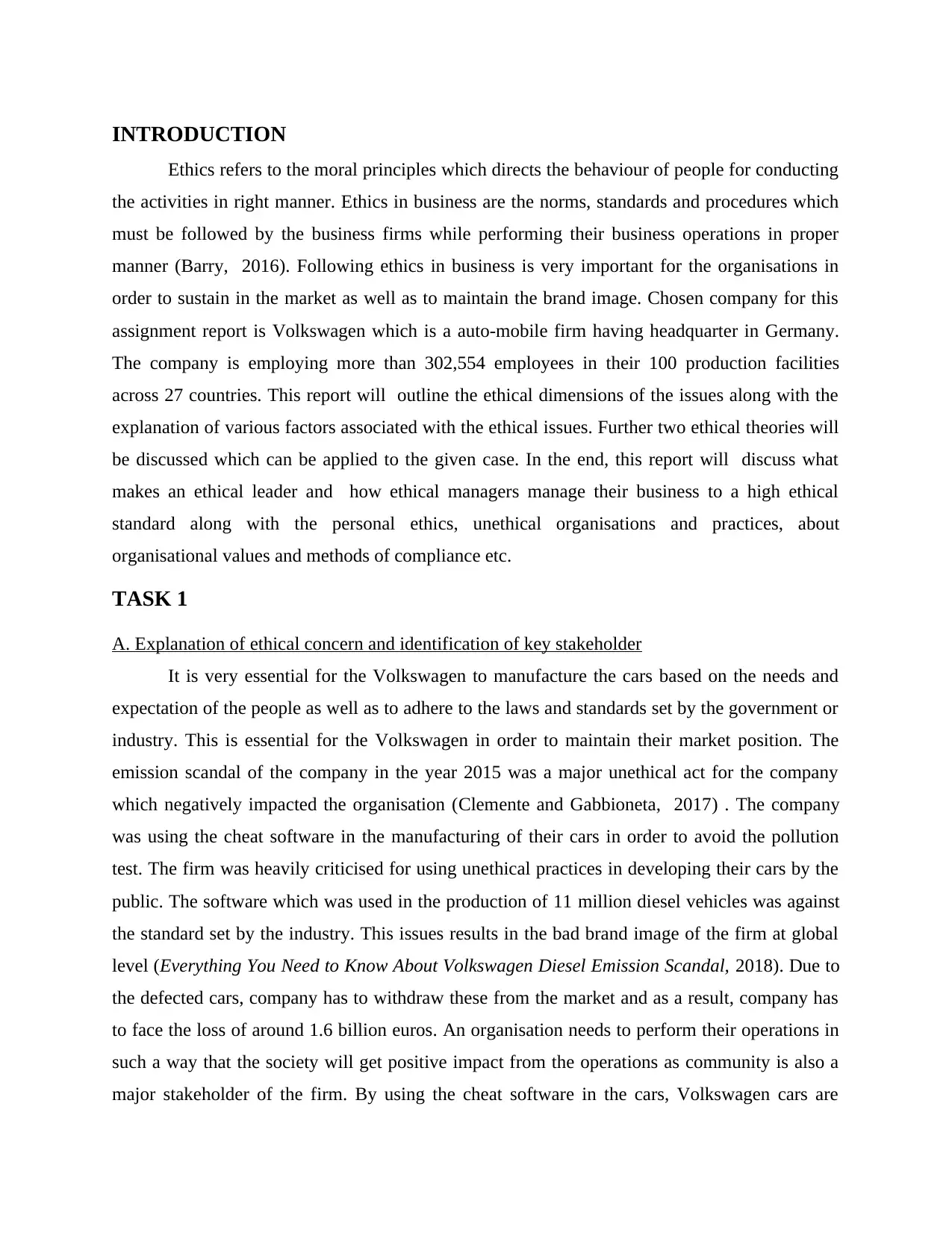
INTRODUCTION
Ethics refers to the moral principles which directs the behaviour of people for conducting
the activities in right manner. Ethics in business are the norms, standards and procedures which
must be followed by the business firms while performing their business operations in proper
manner (Barry, 2016). Following ethics in business is very important for the organisations in
order to sustain in the market as well as to maintain the brand image. Chosen company for this
assignment report is Volkswagen which is a auto-mobile firm having headquarter in Germany.
The company is employing more than 302,554 employees in their 100 production facilities
across 27 countries. This report will outline the ethical dimensions of the issues along with the
explanation of various factors associated with the ethical issues. Further two ethical theories will
be discussed which can be applied to the given case. In the end, this report will discuss what
makes an ethical leader and how ethical managers manage their business to a high ethical
standard along with the personal ethics, unethical organisations and practices, about
organisational values and methods of compliance etc.
TASK 1
A. Explanation of ethical concern and identification of key stakeholder
It is very essential for the Volkswagen to manufacture the cars based on the needs and
expectation of the people as well as to adhere to the laws and standards set by the government or
industry. This is essential for the Volkswagen in order to maintain their market position. The
emission scandal of the company in the year 2015 was a major unethical act for the company
which negatively impacted the organisation (Clemente and Gabbioneta, 2017) . The company
was using the cheat software in the manufacturing of their cars in order to avoid the pollution
test. The firm was heavily criticised for using unethical practices in developing their cars by the
public. The software which was used in the production of 11 million diesel vehicles was against
the standard set by the industry. This issues results in the bad brand image of the firm at global
level (Everything You Need to Know About Volkswagen Diesel Emission Scandal, 2018). Due to
the defected cars, company has to withdraw these from the market and as a result, company has
to face the loss of around 1.6 billion euros. An organisation needs to perform their operations in
such a way that the society will get positive impact from the operations as community is also a
major stakeholder of the firm. By using the cheat software in the cars, Volkswagen cars are
Ethics refers to the moral principles which directs the behaviour of people for conducting
the activities in right manner. Ethics in business are the norms, standards and procedures which
must be followed by the business firms while performing their business operations in proper
manner (Barry, 2016). Following ethics in business is very important for the organisations in
order to sustain in the market as well as to maintain the brand image. Chosen company for this
assignment report is Volkswagen which is a auto-mobile firm having headquarter in Germany.
The company is employing more than 302,554 employees in their 100 production facilities
across 27 countries. This report will outline the ethical dimensions of the issues along with the
explanation of various factors associated with the ethical issues. Further two ethical theories will
be discussed which can be applied to the given case. In the end, this report will discuss what
makes an ethical leader and how ethical managers manage their business to a high ethical
standard along with the personal ethics, unethical organisations and practices, about
organisational values and methods of compliance etc.
TASK 1
A. Explanation of ethical concern and identification of key stakeholder
It is very essential for the Volkswagen to manufacture the cars based on the needs and
expectation of the people as well as to adhere to the laws and standards set by the government or
industry. This is essential for the Volkswagen in order to maintain their market position. The
emission scandal of the company in the year 2015 was a major unethical act for the company
which negatively impacted the organisation (Clemente and Gabbioneta, 2017) . The company
was using the cheat software in the manufacturing of their cars in order to avoid the pollution
test. The firm was heavily criticised for using unethical practices in developing their cars by the
public. The software which was used in the production of 11 million diesel vehicles was against
the standard set by the industry. This issues results in the bad brand image of the firm at global
level (Everything You Need to Know About Volkswagen Diesel Emission Scandal, 2018). Due to
the defected cars, company has to withdraw these from the market and as a result, company has
to face the loss of around 1.6 billion euros. An organisation needs to perform their operations in
such a way that the society will get positive impact from the operations as community is also a
major stakeholder of the firm. By using the cheat software in the cars, Volkswagen cars are
⊘ This is a preview!⊘
Do you want full access?
Subscribe today to unlock all pages.

Trusted by 1+ million students worldwide
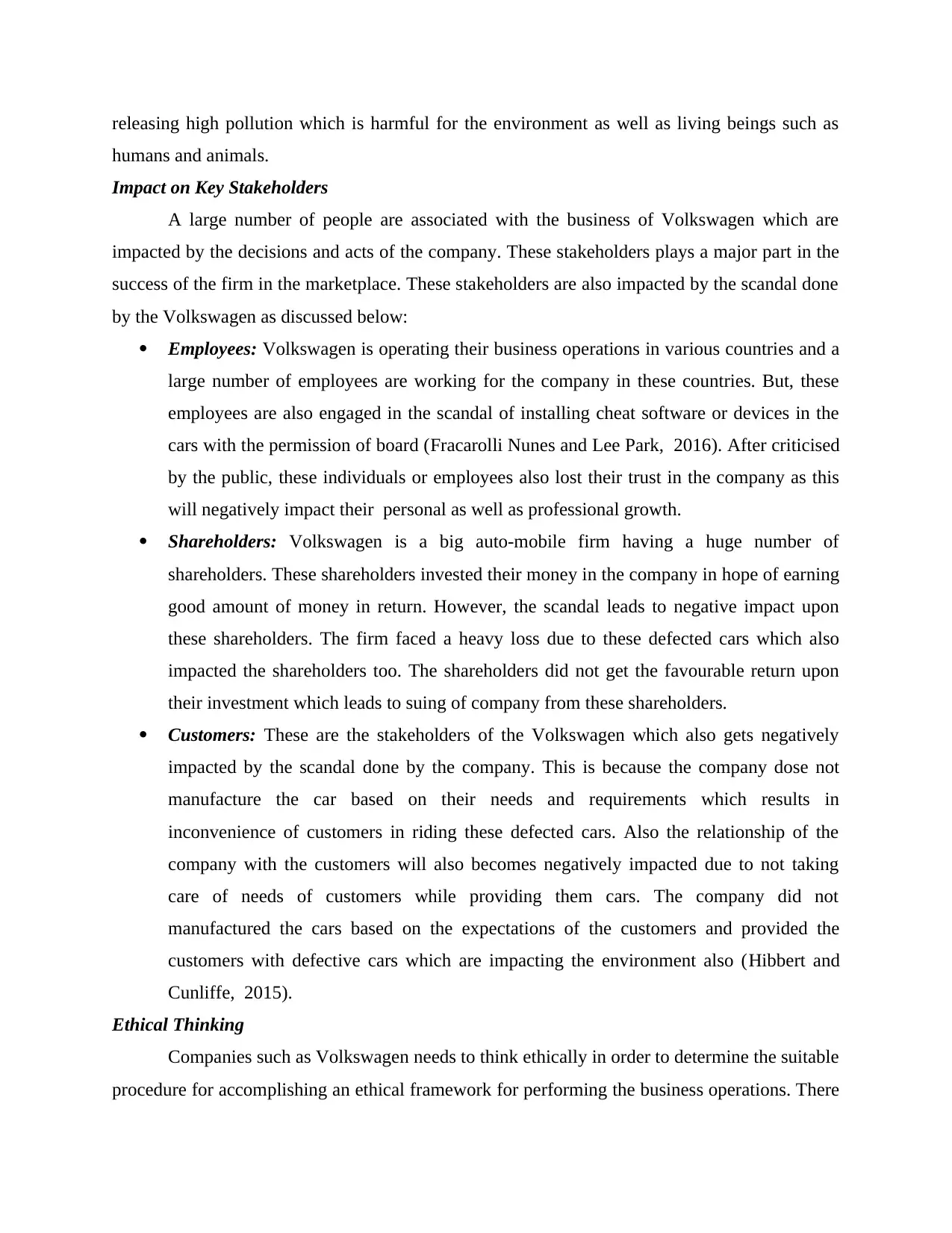
releasing high pollution which is harmful for the environment as well as living beings such as
humans and animals.
Impact on Key Stakeholders
A large number of people are associated with the business of Volkswagen which are
impacted by the decisions and acts of the company. These stakeholders plays a major part in the
success of the firm in the marketplace. These stakeholders are also impacted by the scandal done
by the Volkswagen as discussed below:
Employees: Volkswagen is operating their business operations in various countries and a
large number of employees are working for the company in these countries. But, these
employees are also engaged in the scandal of installing cheat software or devices in the
cars with the permission of board (Fracarolli Nunes and Lee Park, 2016). After criticised
by the public, these individuals or employees also lost their trust in the company as this
will negatively impact their personal as well as professional growth.
Shareholders: Volkswagen is a big auto-mobile firm having a huge number of
shareholders. These shareholders invested their money in the company in hope of earning
good amount of money in return. However, the scandal leads to negative impact upon
these shareholders. The firm faced a heavy loss due to these defected cars which also
impacted the shareholders too. The shareholders did not get the favourable return upon
their investment which leads to suing of company from these shareholders.
Customers: These are the stakeholders of the Volkswagen which also gets negatively
impacted by the scandal done by the company. This is because the company dose not
manufacture the car based on their needs and requirements which results in
inconvenience of customers in riding these defected cars. Also the relationship of the
company with the customers will also becomes negatively impacted due to not taking
care of needs of customers while providing them cars. The company did not
manufactured the cars based on the expectations of the customers and provided the
customers with defective cars which are impacting the environment also (Hibbert and
Cunliffe, 2015).
Ethical Thinking
Companies such as Volkswagen needs to think ethically in order to determine the suitable
procedure for accomplishing an ethical framework for performing the business operations. There
humans and animals.
Impact on Key Stakeholders
A large number of people are associated with the business of Volkswagen which are
impacted by the decisions and acts of the company. These stakeholders plays a major part in the
success of the firm in the marketplace. These stakeholders are also impacted by the scandal done
by the Volkswagen as discussed below:
Employees: Volkswagen is operating their business operations in various countries and a
large number of employees are working for the company in these countries. But, these
employees are also engaged in the scandal of installing cheat software or devices in the
cars with the permission of board (Fracarolli Nunes and Lee Park, 2016). After criticised
by the public, these individuals or employees also lost their trust in the company as this
will negatively impact their personal as well as professional growth.
Shareholders: Volkswagen is a big auto-mobile firm having a huge number of
shareholders. These shareholders invested their money in the company in hope of earning
good amount of money in return. However, the scandal leads to negative impact upon
these shareholders. The firm faced a heavy loss due to these defected cars which also
impacted the shareholders too. The shareholders did not get the favourable return upon
their investment which leads to suing of company from these shareholders.
Customers: These are the stakeholders of the Volkswagen which also gets negatively
impacted by the scandal done by the company. This is because the company dose not
manufacture the car based on their needs and requirements which results in
inconvenience of customers in riding these defected cars. Also the relationship of the
company with the customers will also becomes negatively impacted due to not taking
care of needs of customers while providing them cars. The company did not
manufactured the cars based on the expectations of the customers and provided the
customers with defective cars which are impacting the environment also (Hibbert and
Cunliffe, 2015).
Ethical Thinking
Companies such as Volkswagen needs to think ethically in order to determine the suitable
procedure for accomplishing an ethical framework for performing the business operations. There
Paraphrase This Document
Need a fresh take? Get an instant paraphrase of this document with our AI Paraphraser
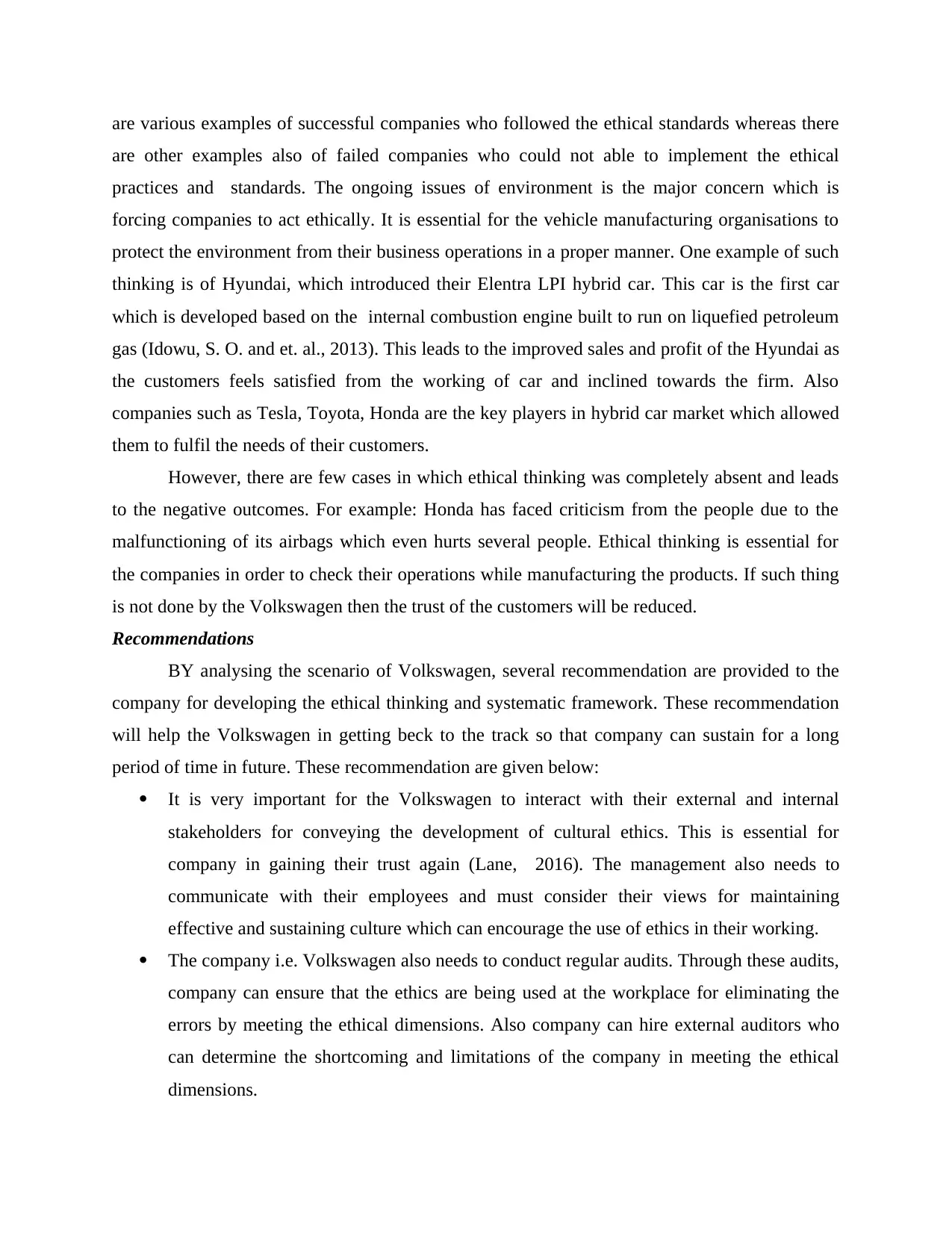
are various examples of successful companies who followed the ethical standards whereas there
are other examples also of failed companies who could not able to implement the ethical
practices and standards. The ongoing issues of environment is the major concern which is
forcing companies to act ethically. It is essential for the vehicle manufacturing organisations to
protect the environment from their business operations in a proper manner. One example of such
thinking is of Hyundai, which introduced their Elentra LPI hybrid car. This car is the first car
which is developed based on the internal combustion engine built to run on liquefied petroleum
gas (Idowu, S. O. and et. al., 2013). This leads to the improved sales and profit of the Hyundai as
the customers feels satisfied from the working of car and inclined towards the firm. Also
companies such as Tesla, Toyota, Honda are the key players in hybrid car market which allowed
them to fulfil the needs of their customers.
However, there are few cases in which ethical thinking was completely absent and leads
to the negative outcomes. For example: Honda has faced criticism from the people due to the
malfunctioning of its airbags which even hurts several people. Ethical thinking is essential for
the companies in order to check their operations while manufacturing the products. If such thing
is not done by the Volkswagen then the trust of the customers will be reduced.
Recommendations
BY analysing the scenario of Volkswagen, several recommendation are provided to the
company for developing the ethical thinking and systematic framework. These recommendation
will help the Volkswagen in getting beck to the track so that company can sustain for a long
period of time in future. These recommendation are given below:
It is very important for the Volkswagen to interact with their external and internal
stakeholders for conveying the development of cultural ethics. This is essential for
company in gaining their trust again (Lane, 2016). The management also needs to
communicate with their employees and must consider their views for maintaining
effective and sustaining culture which can encourage the use of ethics in their working.
The company i.e. Volkswagen also needs to conduct regular audits. Through these audits,
company can ensure that the ethics are being used at the workplace for eliminating the
errors by meeting the ethical dimensions. Also company can hire external auditors who
can determine the shortcoming and limitations of the company in meeting the ethical
dimensions.
are other examples also of failed companies who could not able to implement the ethical
practices and standards. The ongoing issues of environment is the major concern which is
forcing companies to act ethically. It is essential for the vehicle manufacturing organisations to
protect the environment from their business operations in a proper manner. One example of such
thinking is of Hyundai, which introduced their Elentra LPI hybrid car. This car is the first car
which is developed based on the internal combustion engine built to run on liquefied petroleum
gas (Idowu, S. O. and et. al., 2013). This leads to the improved sales and profit of the Hyundai as
the customers feels satisfied from the working of car and inclined towards the firm. Also
companies such as Tesla, Toyota, Honda are the key players in hybrid car market which allowed
them to fulfil the needs of their customers.
However, there are few cases in which ethical thinking was completely absent and leads
to the negative outcomes. For example: Honda has faced criticism from the people due to the
malfunctioning of its airbags which even hurts several people. Ethical thinking is essential for
the companies in order to check their operations while manufacturing the products. If such thing
is not done by the Volkswagen then the trust of the customers will be reduced.
Recommendations
BY analysing the scenario of Volkswagen, several recommendation are provided to the
company for developing the ethical thinking and systematic framework. These recommendation
will help the Volkswagen in getting beck to the track so that company can sustain for a long
period of time in future. These recommendation are given below:
It is very important for the Volkswagen to interact with their external and internal
stakeholders for conveying the development of cultural ethics. This is essential for
company in gaining their trust again (Lane, 2016). The management also needs to
communicate with their employees and must consider their views for maintaining
effective and sustaining culture which can encourage the use of ethics in their working.
The company i.e. Volkswagen also needs to conduct regular audits. Through these audits,
company can ensure that the ethics are being used at the workplace for eliminating the
errors by meeting the ethical dimensions. Also company can hire external auditors who
can determine the shortcoming and limitations of the company in meeting the ethical
dimensions.
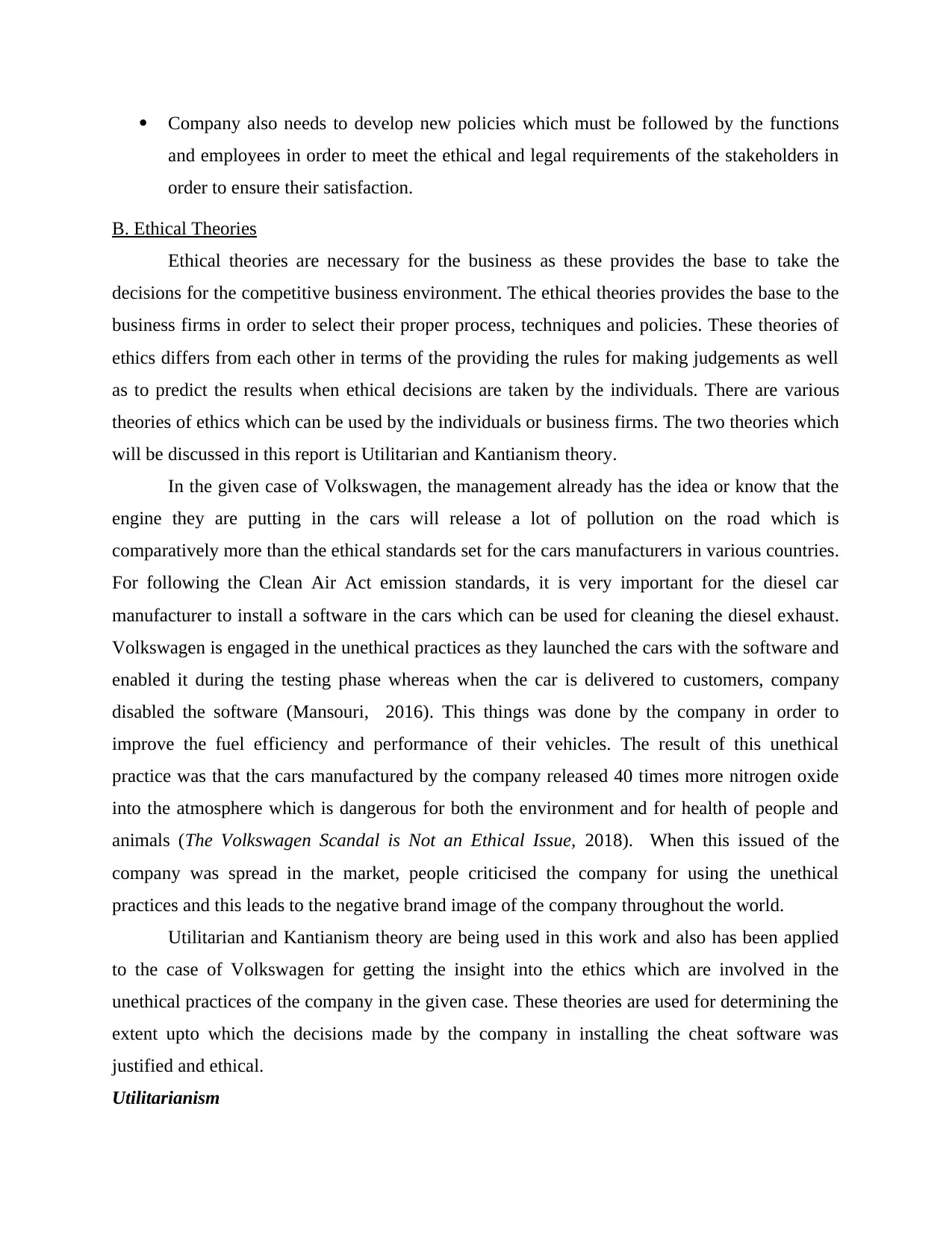
Company also needs to develop new policies which must be followed by the functions
and employees in order to meet the ethical and legal requirements of the stakeholders in
order to ensure their satisfaction.
B. Ethical Theories
Ethical theories are necessary for the business as these provides the base to take the
decisions for the competitive business environment. The ethical theories provides the base to the
business firms in order to select their proper process, techniques and policies. These theories of
ethics differs from each other in terms of the providing the rules for making judgements as well
as to predict the results when ethical decisions are taken by the individuals. There are various
theories of ethics which can be used by the individuals or business firms. The two theories which
will be discussed in this report is Utilitarian and Kantianism theory.
In the given case of Volkswagen, the management already has the idea or know that the
engine they are putting in the cars will release a lot of pollution on the road which is
comparatively more than the ethical standards set for the cars manufacturers in various countries.
For following the Clean Air Act emission standards, it is very important for the diesel car
manufacturer to install a software in the cars which can be used for cleaning the diesel exhaust.
Volkswagen is engaged in the unethical practices as they launched the cars with the software and
enabled it during the testing phase whereas when the car is delivered to customers, company
disabled the software (Mansouri, 2016). This things was done by the company in order to
improve the fuel efficiency and performance of their vehicles. The result of this unethical
practice was that the cars manufactured by the company released 40 times more nitrogen oxide
into the atmosphere which is dangerous for both the environment and for health of people and
animals (The Volkswagen Scandal is Not an Ethical Issue, 2018). When this issued of the
company was spread in the market, people criticised the company for using the unethical
practices and this leads to the negative brand image of the company throughout the world.
Utilitarian and Kantianism theory are being used in this work and also has been applied
to the case of Volkswagen for getting the insight into the ethics which are involved in the
unethical practices of the company in the given case. These theories are used for determining the
extent upto which the decisions made by the company in installing the cheat software was
justified and ethical.
Utilitarianism
and employees in order to meet the ethical and legal requirements of the stakeholders in
order to ensure their satisfaction.
B. Ethical Theories
Ethical theories are necessary for the business as these provides the base to take the
decisions for the competitive business environment. The ethical theories provides the base to the
business firms in order to select their proper process, techniques and policies. These theories of
ethics differs from each other in terms of the providing the rules for making judgements as well
as to predict the results when ethical decisions are taken by the individuals. There are various
theories of ethics which can be used by the individuals or business firms. The two theories which
will be discussed in this report is Utilitarian and Kantianism theory.
In the given case of Volkswagen, the management already has the idea or know that the
engine they are putting in the cars will release a lot of pollution on the road which is
comparatively more than the ethical standards set for the cars manufacturers in various countries.
For following the Clean Air Act emission standards, it is very important for the diesel car
manufacturer to install a software in the cars which can be used for cleaning the diesel exhaust.
Volkswagen is engaged in the unethical practices as they launched the cars with the software and
enabled it during the testing phase whereas when the car is delivered to customers, company
disabled the software (Mansouri, 2016). This things was done by the company in order to
improve the fuel efficiency and performance of their vehicles. The result of this unethical
practice was that the cars manufactured by the company released 40 times more nitrogen oxide
into the atmosphere which is dangerous for both the environment and for health of people and
animals (The Volkswagen Scandal is Not an Ethical Issue, 2018). When this issued of the
company was spread in the market, people criticised the company for using the unethical
practices and this leads to the negative brand image of the company throughout the world.
Utilitarian and Kantianism theory are being used in this work and also has been applied
to the case of Volkswagen for getting the insight into the ethics which are involved in the
unethical practices of the company in the given case. These theories are used for determining the
extent upto which the decisions made by the company in installing the cheat software was
justified and ethical.
Utilitarianism
⊘ This is a preview!⊘
Do you want full access?
Subscribe today to unlock all pages.

Trusted by 1+ million students worldwide
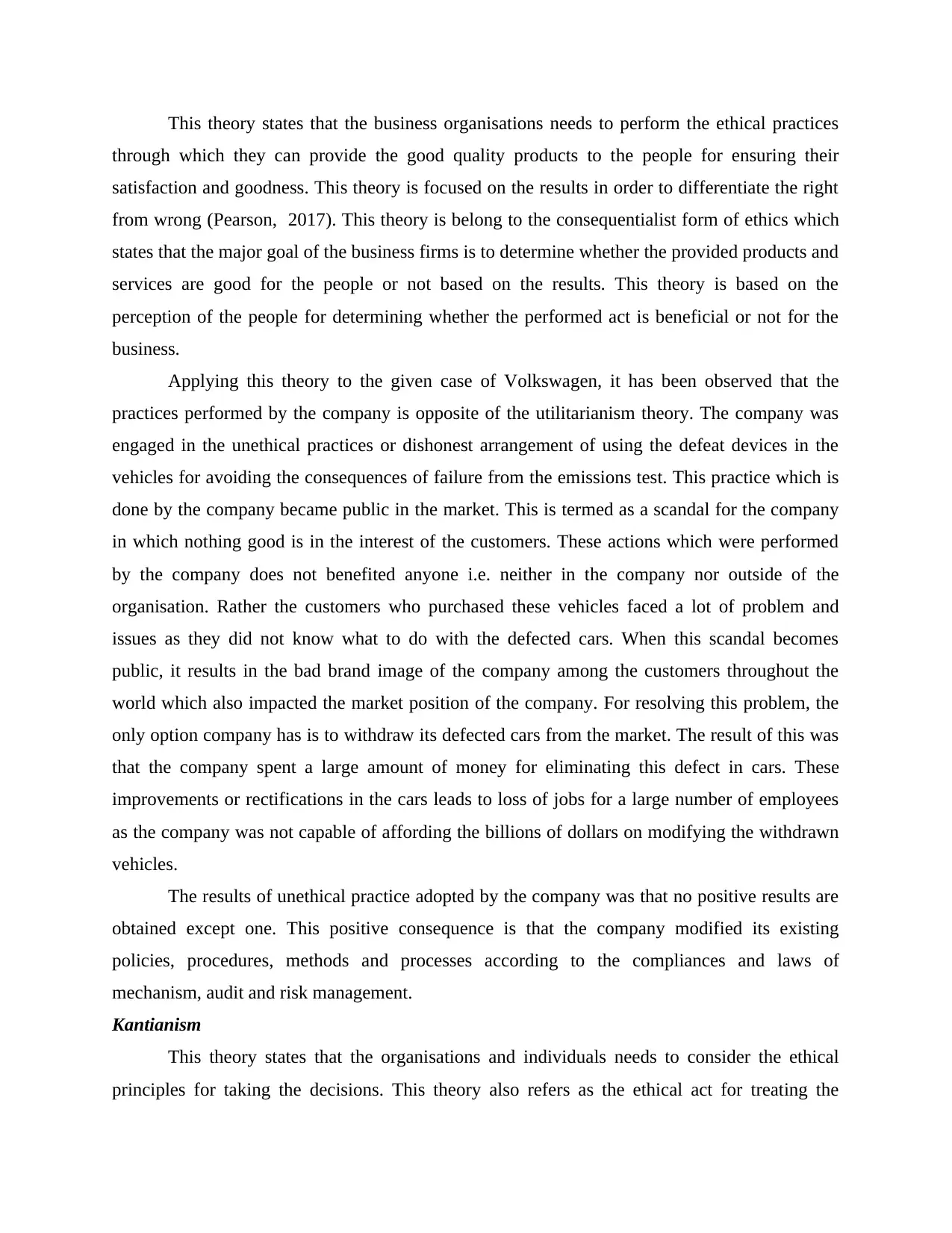
This theory states that the business organisations needs to perform the ethical practices
through which they can provide the good quality products to the people for ensuring their
satisfaction and goodness. This theory is focused on the results in order to differentiate the right
from wrong (Pearson, 2017). This theory is belong to the consequentialist form of ethics which
states that the major goal of the business firms is to determine whether the provided products and
services are good for the people or not based on the results. This theory is based on the
perception of the people for determining whether the performed act is beneficial or not for the
business.
Applying this theory to the given case of Volkswagen, it has been observed that the
practices performed by the company is opposite of the utilitarianism theory. The company was
engaged in the unethical practices or dishonest arrangement of using the defeat devices in the
vehicles for avoiding the consequences of failure from the emissions test. This practice which is
done by the company became public in the market. This is termed as a scandal for the company
in which nothing good is in the interest of the customers. These actions which were performed
by the company does not benefited anyone i.e. neither in the company nor outside of the
organisation. Rather the customers who purchased these vehicles faced a lot of problem and
issues as they did not know what to do with the defected cars. When this scandal becomes
public, it results in the bad brand image of the company among the customers throughout the
world which also impacted the market position of the company. For resolving this problem, the
only option company has is to withdraw its defected cars from the market. The result of this was
that the company spent a large amount of money for eliminating this defect in cars. These
improvements or rectifications in the cars leads to loss of jobs for a large number of employees
as the company was not capable of affording the billions of dollars on modifying the withdrawn
vehicles.
The results of unethical practice adopted by the company was that no positive results are
obtained except one. This positive consequence is that the company modified its existing
policies, procedures, methods and processes according to the compliances and laws of
mechanism, audit and risk management.
Kantianism
This theory states that the organisations and individuals needs to consider the ethical
principles for taking the decisions. This theory also refers as the ethical act for treating the
through which they can provide the good quality products to the people for ensuring their
satisfaction and goodness. This theory is focused on the results in order to differentiate the right
from wrong (Pearson, 2017). This theory is belong to the consequentialist form of ethics which
states that the major goal of the business firms is to determine whether the provided products and
services are good for the people or not based on the results. This theory is based on the
perception of the people for determining whether the performed act is beneficial or not for the
business.
Applying this theory to the given case of Volkswagen, it has been observed that the
practices performed by the company is opposite of the utilitarianism theory. The company was
engaged in the unethical practices or dishonest arrangement of using the defeat devices in the
vehicles for avoiding the consequences of failure from the emissions test. This practice which is
done by the company became public in the market. This is termed as a scandal for the company
in which nothing good is in the interest of the customers. These actions which were performed
by the company does not benefited anyone i.e. neither in the company nor outside of the
organisation. Rather the customers who purchased these vehicles faced a lot of problem and
issues as they did not know what to do with the defected cars. When this scandal becomes
public, it results in the bad brand image of the company among the customers throughout the
world which also impacted the market position of the company. For resolving this problem, the
only option company has is to withdraw its defected cars from the market. The result of this was
that the company spent a large amount of money for eliminating this defect in cars. These
improvements or rectifications in the cars leads to loss of jobs for a large number of employees
as the company was not capable of affording the billions of dollars on modifying the withdrawn
vehicles.
The results of unethical practice adopted by the company was that no positive results are
obtained except one. This positive consequence is that the company modified its existing
policies, procedures, methods and processes according to the compliances and laws of
mechanism, audit and risk management.
Kantianism
This theory states that the organisations and individuals needs to consider the ethical
principles for taking the decisions. This theory also refers as the ethical act for treating the
Paraphrase This Document
Need a fresh take? Get an instant paraphrase of this document with our AI Paraphraser
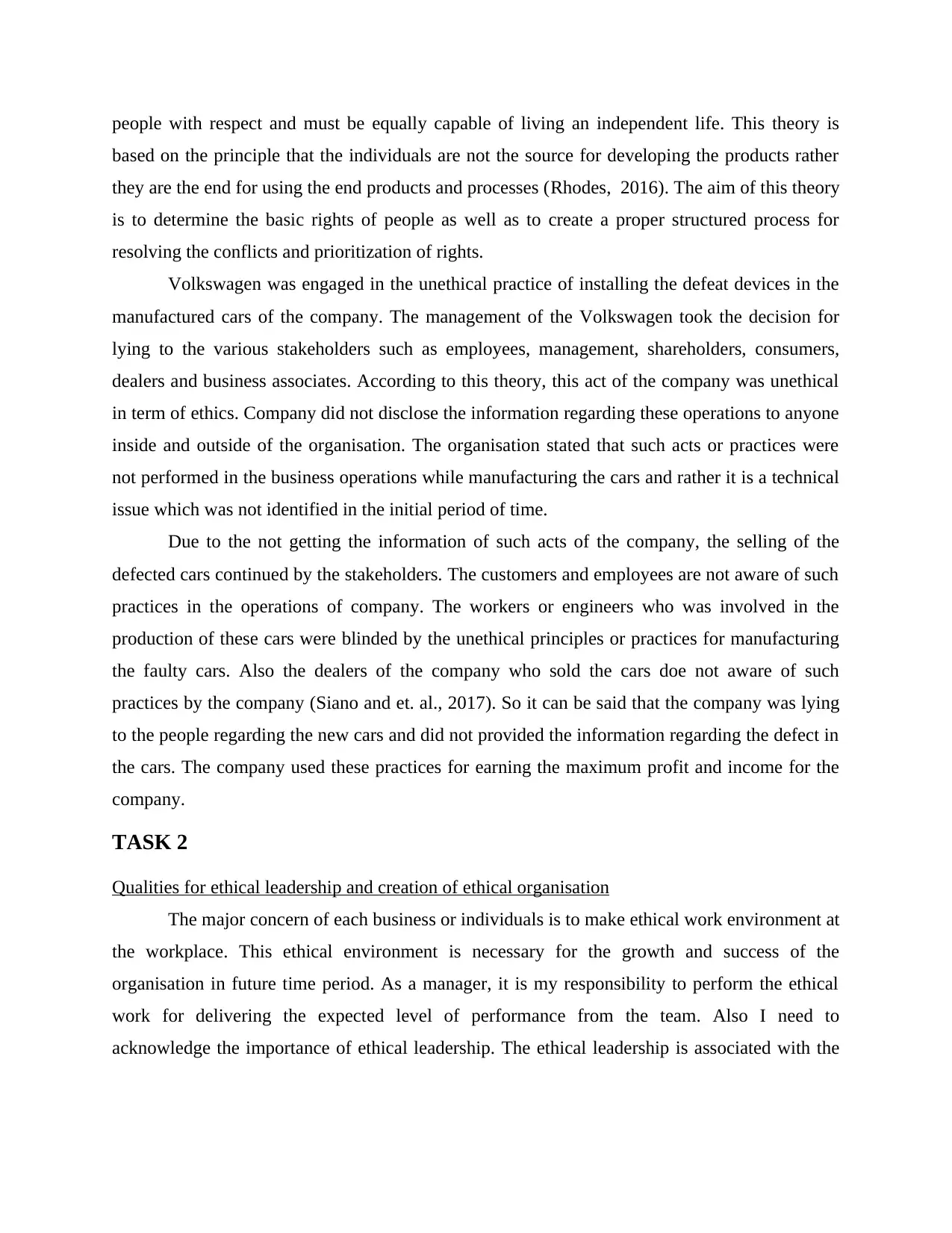
people with respect and must be equally capable of living an independent life. This theory is
based on the principle that the individuals are not the source for developing the products rather
they are the end for using the end products and processes (Rhodes, 2016). The aim of this theory
is to determine the basic rights of people as well as to create a proper structured process for
resolving the conflicts and prioritization of rights.
Volkswagen was engaged in the unethical practice of installing the defeat devices in the
manufactured cars of the company. The management of the Volkswagen took the decision for
lying to the various stakeholders such as employees, management, shareholders, consumers,
dealers and business associates. According to this theory, this act of the company was unethical
in term of ethics. Company did not disclose the information regarding these operations to anyone
inside and outside of the organisation. The organisation stated that such acts or practices were
not performed in the business operations while manufacturing the cars and rather it is a technical
issue which was not identified in the initial period of time.
Due to the not getting the information of such acts of the company, the selling of the
defected cars continued by the stakeholders. The customers and employees are not aware of such
practices in the operations of company. The workers or engineers who was involved in the
production of these cars were blinded by the unethical principles or practices for manufacturing
the faulty cars. Also the dealers of the company who sold the cars doe not aware of such
practices by the company (Siano and et. al., 2017). So it can be said that the company was lying
to the people regarding the new cars and did not provided the information regarding the defect in
the cars. The company used these practices for earning the maximum profit and income for the
company.
TASK 2
Qualities for ethical leadership and creation of ethical organisation
The major concern of each business or individuals is to make ethical work environment at
the workplace. This ethical environment is necessary for the growth and success of the
organisation in future time period. As a manager, it is my responsibility to perform the ethical
work for delivering the expected level of performance from the team. Also I need to
acknowledge the importance of ethical leadership. The ethical leadership is associated with the
based on the principle that the individuals are not the source for developing the products rather
they are the end for using the end products and processes (Rhodes, 2016). The aim of this theory
is to determine the basic rights of people as well as to create a proper structured process for
resolving the conflicts and prioritization of rights.
Volkswagen was engaged in the unethical practice of installing the defeat devices in the
manufactured cars of the company. The management of the Volkswagen took the decision for
lying to the various stakeholders such as employees, management, shareholders, consumers,
dealers and business associates. According to this theory, this act of the company was unethical
in term of ethics. Company did not disclose the information regarding these operations to anyone
inside and outside of the organisation. The organisation stated that such acts or practices were
not performed in the business operations while manufacturing the cars and rather it is a technical
issue which was not identified in the initial period of time.
Due to the not getting the information of such acts of the company, the selling of the
defected cars continued by the stakeholders. The customers and employees are not aware of such
practices in the operations of company. The workers or engineers who was involved in the
production of these cars were blinded by the unethical principles or practices for manufacturing
the faulty cars. Also the dealers of the company who sold the cars doe not aware of such
practices by the company (Siano and et. al., 2017). So it can be said that the company was lying
to the people regarding the new cars and did not provided the information regarding the defect in
the cars. The company used these practices for earning the maximum profit and income for the
company.
TASK 2
Qualities for ethical leadership and creation of ethical organisation
The major concern of each business or individuals is to make ethical work environment at
the workplace. This ethical environment is necessary for the growth and success of the
organisation in future time period. As a manager, it is my responsibility to perform the ethical
work for delivering the expected level of performance from the team. Also I need to
acknowledge the importance of ethical leadership. The ethical leadership is associated with the
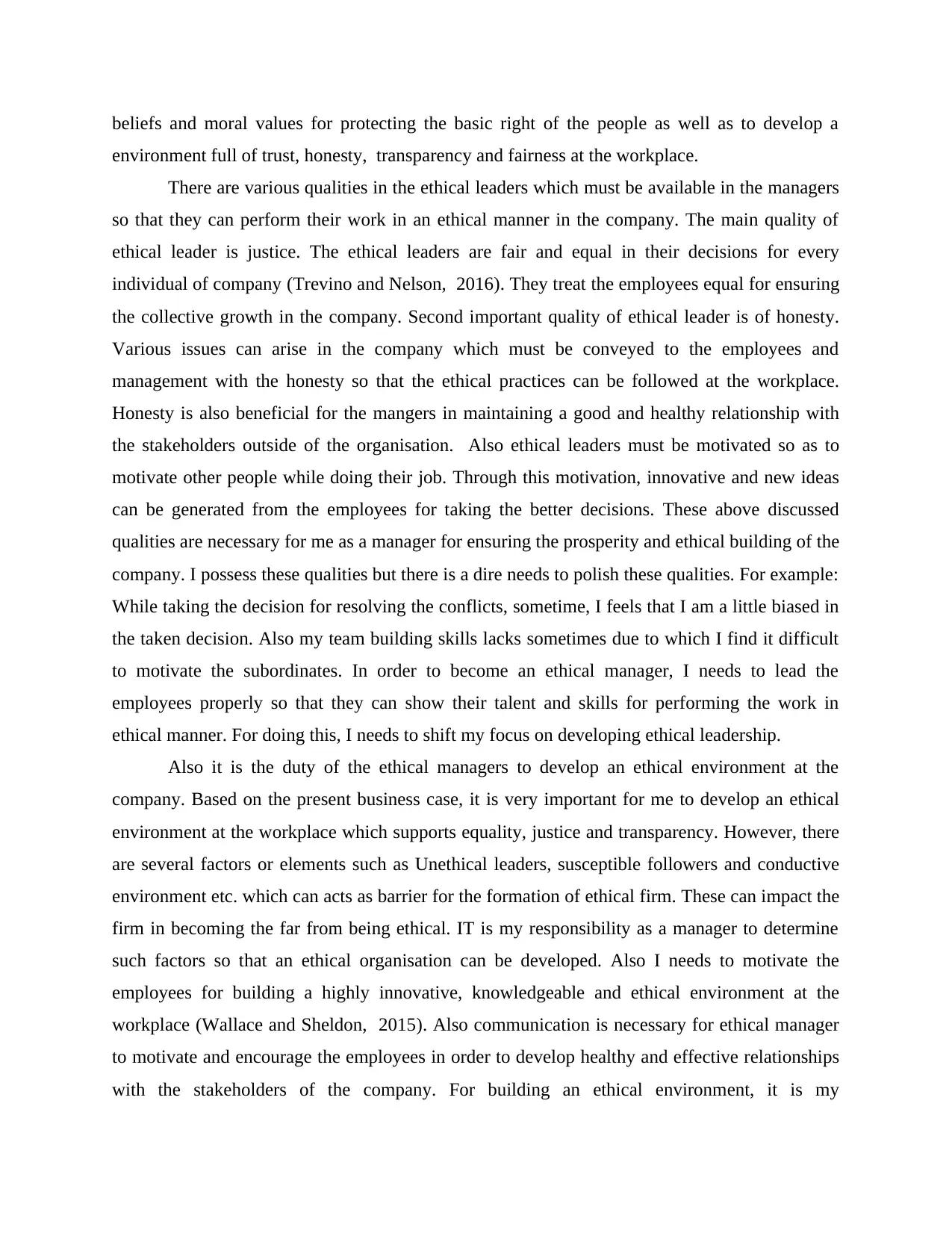
beliefs and moral values for protecting the basic right of the people as well as to develop a
environment full of trust, honesty, transparency and fairness at the workplace.
There are various qualities in the ethical leaders which must be available in the managers
so that they can perform their work in an ethical manner in the company. The main quality of
ethical leader is justice. The ethical leaders are fair and equal in their decisions for every
individual of company (Trevino and Nelson, 2016). They treat the employees equal for ensuring
the collective growth in the company. Second important quality of ethical leader is of honesty.
Various issues can arise in the company which must be conveyed to the employees and
management with the honesty so that the ethical practices can be followed at the workplace.
Honesty is also beneficial for the mangers in maintaining a good and healthy relationship with
the stakeholders outside of the organisation. Also ethical leaders must be motivated so as to
motivate other people while doing their job. Through this motivation, innovative and new ideas
can be generated from the employees for taking the better decisions. These above discussed
qualities are necessary for me as a manager for ensuring the prosperity and ethical building of the
company. I possess these qualities but there is a dire needs to polish these qualities. For example:
While taking the decision for resolving the conflicts, sometime, I feels that I am a little biased in
the taken decision. Also my team building skills lacks sometimes due to which I find it difficult
to motivate the subordinates. In order to become an ethical manager, I needs to lead the
employees properly so that they can show their talent and skills for performing the work in
ethical manner. For doing this, I needs to shift my focus on developing ethical leadership.
Also it is the duty of the ethical managers to develop an ethical environment at the
company. Based on the present business case, it is very important for me to develop an ethical
environment at the workplace which supports equality, justice and transparency. However, there
are several factors or elements such as Unethical leaders, susceptible followers and conductive
environment etc. which can acts as barrier for the formation of ethical firm. These can impact the
firm in becoming the far from being ethical. IT is my responsibility as a manager to determine
such factors so that an ethical organisation can be developed. Also I needs to motivate the
employees for building a highly innovative, knowledgeable and ethical environment at the
workplace (Wallace and Sheldon, 2015). Also communication is necessary for ethical manager
to motivate and encourage the employees in order to develop healthy and effective relationships
with the stakeholders of the company. For building an ethical environment, it is my
environment full of trust, honesty, transparency and fairness at the workplace.
There are various qualities in the ethical leaders which must be available in the managers
so that they can perform their work in an ethical manner in the company. The main quality of
ethical leader is justice. The ethical leaders are fair and equal in their decisions for every
individual of company (Trevino and Nelson, 2016). They treat the employees equal for ensuring
the collective growth in the company. Second important quality of ethical leader is of honesty.
Various issues can arise in the company which must be conveyed to the employees and
management with the honesty so that the ethical practices can be followed at the workplace.
Honesty is also beneficial for the mangers in maintaining a good and healthy relationship with
the stakeholders outside of the organisation. Also ethical leaders must be motivated so as to
motivate other people while doing their job. Through this motivation, innovative and new ideas
can be generated from the employees for taking the better decisions. These above discussed
qualities are necessary for me as a manager for ensuring the prosperity and ethical building of the
company. I possess these qualities but there is a dire needs to polish these qualities. For example:
While taking the decision for resolving the conflicts, sometime, I feels that I am a little biased in
the taken decision. Also my team building skills lacks sometimes due to which I find it difficult
to motivate the subordinates. In order to become an ethical manager, I needs to lead the
employees properly so that they can show their talent and skills for performing the work in
ethical manner. For doing this, I needs to shift my focus on developing ethical leadership.
Also it is the duty of the ethical managers to develop an ethical environment at the
company. Based on the present business case, it is very important for me to develop an ethical
environment at the workplace which supports equality, justice and transparency. However, there
are several factors or elements such as Unethical leaders, susceptible followers and conductive
environment etc. which can acts as barrier for the formation of ethical firm. These can impact the
firm in becoming the far from being ethical. IT is my responsibility as a manager to determine
such factors so that an ethical organisation can be developed. Also I needs to motivate the
employees for building a highly innovative, knowledgeable and ethical environment at the
workplace (Wallace and Sheldon, 2015). Also communication is necessary for ethical manager
to motivate and encourage the employees in order to develop healthy and effective relationships
with the stakeholders of the company. For building an ethical environment, it is my
⊘ This is a preview!⊘
Do you want full access?
Subscribe today to unlock all pages.

Trusted by 1+ million students worldwide
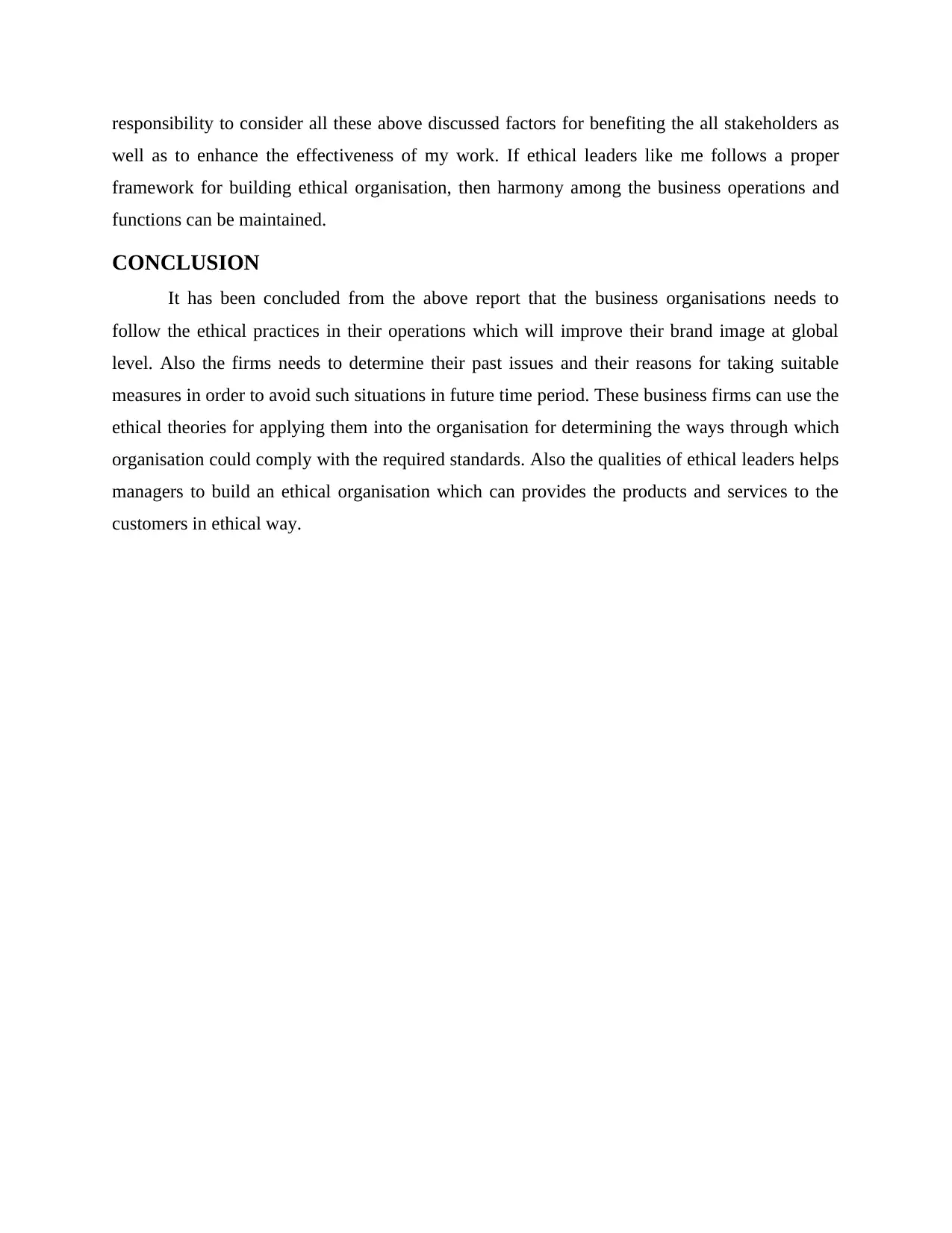
responsibility to consider all these above discussed factors for benefiting the all stakeholders as
well as to enhance the effectiveness of my work. If ethical leaders like me follows a proper
framework for building ethical organisation, then harmony among the business operations and
functions can be maintained.
CONCLUSION
It has been concluded from the above report that the business organisations needs to
follow the ethical practices in their operations which will improve their brand image at global
level. Also the firms needs to determine their past issues and their reasons for taking suitable
measures in order to avoid such situations in future time period. These business firms can use the
ethical theories for applying them into the organisation for determining the ways through which
organisation could comply with the required standards. Also the qualities of ethical leaders helps
managers to build an ethical organisation which can provides the products and services to the
customers in ethical way.
well as to enhance the effectiveness of my work. If ethical leaders like me follows a proper
framework for building ethical organisation, then harmony among the business operations and
functions can be maintained.
CONCLUSION
It has been concluded from the above report that the business organisations needs to
follow the ethical practices in their operations which will improve their brand image at global
level. Also the firms needs to determine their past issues and their reasons for taking suitable
measures in order to avoid such situations in future time period. These business firms can use the
ethical theories for applying them into the organisation for determining the ways through which
organisation could comply with the required standards. Also the qualities of ethical leaders helps
managers to build an ethical organisation which can provides the products and services to the
customers in ethical way.
Paraphrase This Document
Need a fresh take? Get an instant paraphrase of this document with our AI Paraphraser
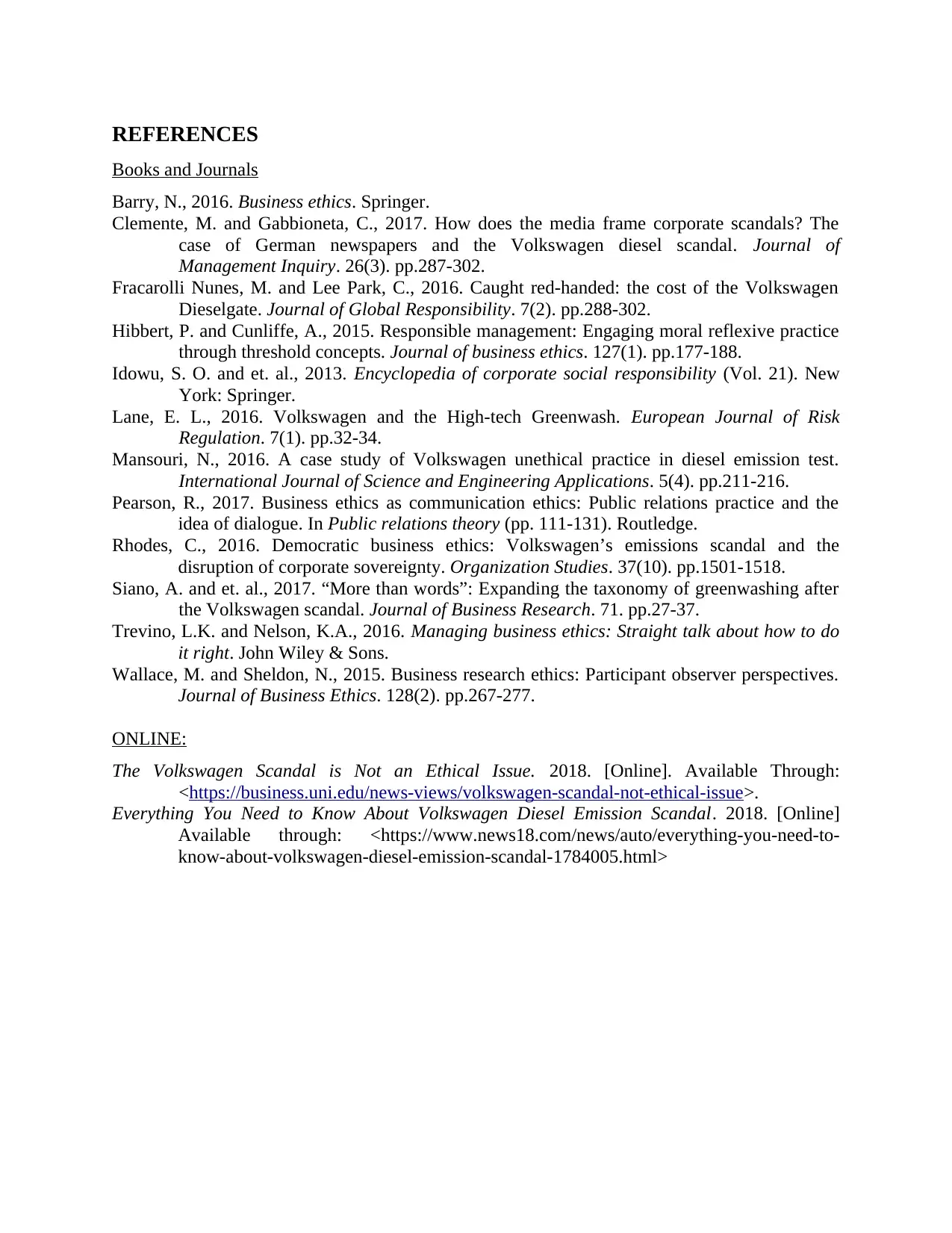
REFERENCES
Books and Journals
Barry, N., 2016. Business ethics. Springer.
Clemente, M. and Gabbioneta, C., 2017. How does the media frame corporate scandals? The
case of German newspapers and the Volkswagen diesel scandal. Journal of
Management Inquiry. 26(3). pp.287-302.
Fracarolli Nunes, M. and Lee Park, C., 2016. Caught red-handed: the cost of the Volkswagen
Dieselgate. Journal of Global Responsibility. 7(2). pp.288-302.
Hibbert, P. and Cunliffe, A., 2015. Responsible management: Engaging moral reflexive practice
through threshold concepts. Journal of business ethics. 127(1). pp.177-188.
Idowu, S. O. and et. al., 2013. Encyclopedia of corporate social responsibility (Vol. 21). New
York: Springer.
Lane, E. L., 2016. Volkswagen and the High-tech Greenwash. European Journal of Risk
Regulation. 7(1). pp.32-34.
Mansouri, N., 2016. A case study of Volkswagen unethical practice in diesel emission test.
International Journal of Science and Engineering Applications. 5(4). pp.211-216.
Pearson, R., 2017. Business ethics as communication ethics: Public relations practice and the
idea of dialogue. In Public relations theory (pp. 111-131). Routledge.
Rhodes, C., 2016. Democratic business ethics: Volkswagen’s emissions scandal and the
disruption of corporate sovereignty. Organization Studies. 37(10). pp.1501-1518.
Siano, A. and et. al., 2017. “More than words”: Expanding the taxonomy of greenwashing after
the Volkswagen scandal. Journal of Business Research. 71. pp.27-37.
Trevino, L.K. and Nelson, K.A., 2016. Managing business ethics: Straight talk about how to do
it right. John Wiley & Sons.
Wallace, M. and Sheldon, N., 2015. Business research ethics: Participant observer perspectives.
Journal of Business Ethics. 128(2). pp.267-277.
ONLINE:
The Volkswagen Scandal is Not an Ethical Issue. 2018. [Online]. Available Through:
<https://business.uni.edu/news-views/volkswagen-scandal-not-ethical-issue>.
Everything You Need to Know About Volkswagen Diesel Emission Scandal. 2018. [Online]
Available through: <https://www.news18.com/news/auto/everything-you-need-to-
know-about-volkswagen-diesel-emission-scandal-1784005.html>
Books and Journals
Barry, N., 2016. Business ethics. Springer.
Clemente, M. and Gabbioneta, C., 2017. How does the media frame corporate scandals? The
case of German newspapers and the Volkswagen diesel scandal. Journal of
Management Inquiry. 26(3). pp.287-302.
Fracarolli Nunes, M. and Lee Park, C., 2016. Caught red-handed: the cost of the Volkswagen
Dieselgate. Journal of Global Responsibility. 7(2). pp.288-302.
Hibbert, P. and Cunliffe, A., 2015. Responsible management: Engaging moral reflexive practice
through threshold concepts. Journal of business ethics. 127(1). pp.177-188.
Idowu, S. O. and et. al., 2013. Encyclopedia of corporate social responsibility (Vol. 21). New
York: Springer.
Lane, E. L., 2016. Volkswagen and the High-tech Greenwash. European Journal of Risk
Regulation. 7(1). pp.32-34.
Mansouri, N., 2016. A case study of Volkswagen unethical practice in diesel emission test.
International Journal of Science and Engineering Applications. 5(4). pp.211-216.
Pearson, R., 2017. Business ethics as communication ethics: Public relations practice and the
idea of dialogue. In Public relations theory (pp. 111-131). Routledge.
Rhodes, C., 2016. Democratic business ethics: Volkswagen’s emissions scandal and the
disruption of corporate sovereignty. Organization Studies. 37(10). pp.1501-1518.
Siano, A. and et. al., 2017. “More than words”: Expanding the taxonomy of greenwashing after
the Volkswagen scandal. Journal of Business Research. 71. pp.27-37.
Trevino, L.K. and Nelson, K.A., 2016. Managing business ethics: Straight talk about how to do
it right. John Wiley & Sons.
Wallace, M. and Sheldon, N., 2015. Business research ethics: Participant observer perspectives.
Journal of Business Ethics. 128(2). pp.267-277.
ONLINE:
The Volkswagen Scandal is Not an Ethical Issue. 2018. [Online]. Available Through:
<https://business.uni.edu/news-views/volkswagen-scandal-not-ethical-issue>.
Everything You Need to Know About Volkswagen Diesel Emission Scandal. 2018. [Online]
Available through: <https://www.news18.com/news/auto/everything-you-need-to-
know-about-volkswagen-diesel-emission-scandal-1784005.html>
1 out of 11
Related Documents
Your All-in-One AI-Powered Toolkit for Academic Success.
+13062052269
info@desklib.com
Available 24*7 on WhatsApp / Email
![[object Object]](/_next/static/media/star-bottom.7253800d.svg)
Unlock your academic potential
Copyright © 2020–2026 A2Z Services. All Rights Reserved. Developed and managed by ZUCOL.





